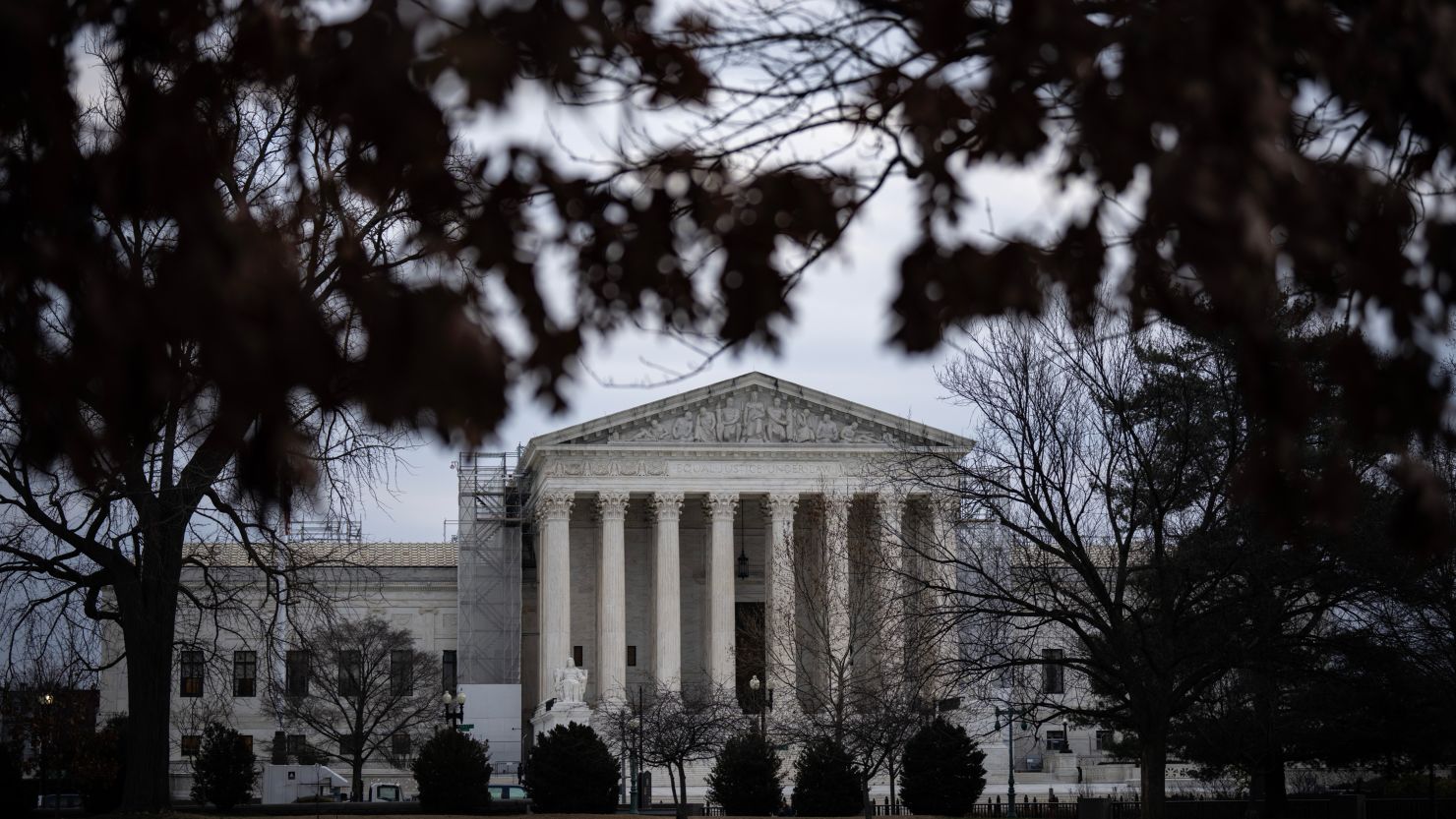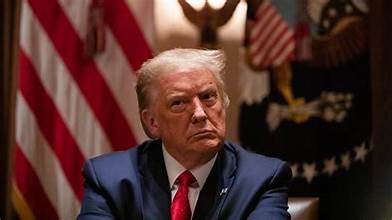Here’s what the Supreme Court faces as justices discuss Trump’s eligibility

The US Supreme Court is now confronting an election case of unparalleled weight that will determine Donald Trump’s prospects to regain the White House and influence public regard for an increasingly embattled court.
The new controversy from Colorado arrives as the nine justices face more scrutiny and the country is more polarized than in 2000, the last time the court was at the center of a presidential election battle, in the case of Bush v. Gore.
The justices’ handling of the fight over Trump’s disqualification from the Colorado ballot – the first moves of which were made on Friday – could intensify the tumult surrounding them or, in the end, give them an opportunity to inspire confidence regarding the norms of democracy as the 2024 elections approach.
Later Friday, the justices announced that they would address the most compelling awaited question before them: whether the former president should be barred from holding future office because of his role in the January 6, 2021, insurrection at the US Capitol. The court set a swift briefing schedule, with oral arguments set for February 8. All parties had emphasized the urgency of the situation.
Trump’s legal filing this week was spiked with characteristic brashness and the continued denial of the last presidential election results that put Joe Biden in the White House. Trump’s lawyers told the Supreme Court, “In 2020, President Trump received more than 74 million votes nationally, and more than 1.3 million votes in Colorado alone, to be reelected as President of the United States.”
“(T)he United States has a long history of political protests that have turned violent. In the summer of 2020 alone, violent protestors targeted the federal courthouse in Portland, Oregon, for over 50 days, repeatedly assaulted federal officers and set fire to the courthouse, all in support of a purported political agenda opposed to the authority of the United States. In the context of violent American political protests, January 6 was not an insurrection and thus no justification of invoking section 3” of the 14th Amendment, the filing claims.
The Colorado Supreme Court decision Trump is appealing said that section, adopted after the Civil War and aimed at former Confederate officials, disqualifies him from state ballots. The state voters challenging Trump struck back immediately to his arguments characterizing an insurrection, asserting in a Thursday evening filing that “this attack was an ‘insurrection’ against the Constitution by any standard.”
Lower court judges have found that Trump incited violence when he implored allies on January 6 to “fight like hell” to “take back our country.”
But Trump contended in his filing to the justices that “his only explicit instructions” on January 6 were for peaceful protests. His legal team even attached a copy of Trump’s speech on the Ellipse that day.
Trump and the others involved in the new paired controversies – voters challenging him on the ballot and the Colorado Republican State Central Committee – want the justices to resolve the unprecedented dispute quickly.
Norma Anderson, a former Republican Colorado legislative leader, and the five other GOP voters who began the case against Trump want it decided by February 11, before a scheduled February 12 mailing of primary ballots in Colorado. The Colorado Republican Committee, backing Trump’s interests, has asked the justices to rule by at least March 5, which is when ballots in the state have to be submitted. That is also Super Tuesday, when more than a dozen other states hold their primaries.
Trump’s lawyers offered no specific timetable but stressed the urgency of the issue, writing that the Colorado Supreme Court decision disqualifying him “would unconstitutionally disenfranchise millions of voters in Colorado and likely be used as a template to disenfranchise tens of millions of voters nationwide.”
For instance, the Maine secretary of state, Shenna Bellows, in December determined that Trump should not be on the ballot. Trump has appealed her decision in Maine state courts, and it could be similarly bound for the US Supreme Court.
Challenges against Trump were also filed Thursday in Illinois and Massachusetts.
What the court faces
The Supreme Court’s stature has diminished in recent years, as the justices reversed decades-old precedent, most notably the 1973 Roe v. Wade, which gave women a constitutional right to end a pregnancy and made abortion legal nationwide.
Meanwhile, investigative news reports of the justices’ off-bench conduct have spurred more controversy, particularly related to lavish travel and other gifts Justice Clarence Thomas has accepted over the years from conservative benefactors.
And for the 2023-24 session, even before Trump-related litigation landed on their steps, the justices had taken on a challenging calendar, with new cases testing Second Amendment gun rights, government regulatory power over consumer and environmental activities, and the Food and Drug Administration’s authority over the abortion pill mifepristone.
This election year has heightened the stakes.
The magnitude of the Trump ballot controversy surpasses anything from 2020 and cannot help but recall 2000, when the justices decided a legal battle over Florida’s decisive electors. By a 5-4 vote, the justices cut off recounts and delivered the presidency to then-Gov. George W. Bush over then-Vice President Al Gore.
The high court in 2000 said its decision – finding that Florida standards for assessing contested ballots unconstitutionally varied from county to county – was essentially confined to the single case.
The current case could be far more consequential for future presidential candidates or anyone who once held office and could be accused of insurrection. The disputed section says, “No person shall … hold any office … under the United States … who, having previously taken an oath … to support the Constitution of the United States, shall have engaged in insurrection or rebellion against the same, or given aid or comfort to the enemies thereof.”
Among core legal questions are whether Congress must first pass legislation that would allow a state to enforce the provision and whether a president falls within the list of officials subject to its disqualification provision. On that latter point, a trial judge in Colorado ruled that the disqualification provision did not cover the presidency, and thus Trump. (The Colorado Supreme Court reversed the trial judge’s determination.)
The justices would also have to determine, as a threshold matter, whether a challenge to the qualifications of a presidential candidate presents a “political question” beyond the domain of the judiciary. Depending on how much they burrow into what actually happened on January 6, they might consider whether Trump’s actions specifically incited the attack on the Capitol to meet the definition of engaging in “insurrection.”
Other pending questions could cover, as the Colorado Republican Committee has asked, whether the First Amendment right of association guarantees a political party’s ability to choose its candidates for a presidential primary.
Trump’s petition separately points to another possible constitutional issue, arguing that the Colorado Supreme Court violated the Constitution’s Electors Clause by usurping legislative authority.
The justices are likely at the outset to narrow the focus of their inquiry with a specific set of legal issues, which could offer the first signal of how broadly they might rule.
And no matter how they resolve it, the Supreme Court, under increasing public scrutiny, is bound to play a leading role in the 2024 election drama, not just now but in the many months ahead as more litigation inevitably rises from lower courts.
In late December, the justices postponed involvement in separate Trump litigation, arising from his claim that he is immune from criminal prosecution for election subversion in around the 2020 presidential contest.
That case is bound to return to the justices, since they would be the ultimate decider of whether a former president is shielded from criminal prosecution, as Trump has argued.
Like the 14th Amendment insurrection controversy, that immunity question has never been resolved. The last word on both will rest with the high court majority. In a final filing for this early round of the cases now before the justices, the Colorado voters challenging Trump’s candidacy on Thursday urged the court to act quickly and to avoid any standard “that would give a free pass to the single person most responsible for the violent attack on the Capitol.”
CNN



